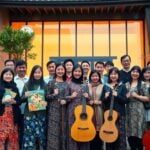Navigating the grant proposal process can often feel like traversing a labyrinth, filled with intricate pathways and potential pitfalls. To successfully secure funding, it is essential to grasp the fundamental components of the process. At its core, a grant proposal is a formal request for financial support, typically submitted to government agencies, foundations, or corporations.
Understanding the specific requirements of each funding source is crucial, as they often have unique guidelines and criteria for evaluation. Familiarizing yourself with these nuances can significantly enhance your chances of success. Moreover, the grant proposal process is not merely about writing a document; it involves strategic planning and relationship building.
Engaging with potential funders before submitting your proposal can provide valuable insights into their priorities and expectations. Many organizations host informational sessions or webinars that can offer guidance on what they are looking for in a proposal. By taking the time to understand the landscape of grant funding, you can position your project in a way that aligns with the funder’s mission and goals, thereby increasing your likelihood of receiving support.
Identifying the Problem and Proposed Solution
A compelling grant proposal begins with a clear identification of the problem you aim to address. This requires thorough research and a deep understanding of the issue at hand. For instance, if you are seeking funding for a community health initiative, you must present data that illustrates the health disparities affecting your target population.
This could include statistics on disease prevalence, access to healthcare services, or socioeconomic factors that contribute to poor health outcomes. By grounding your proposal in concrete evidence, you establish credibility and demonstrate the urgency of your project. Once you have articulated the problem, the next step is to propose a viable solution.
This should be a well-thought-out plan that not only addresses the identified issue but also showcases innovation and feasibility. For example, if your project aims to improve mental health services in underserved communities, outline specific strategies such as mobile clinics, telehealth options, or community workshops. It is essential to convey how your solution is not only effective but also sustainable in the long term.
Funders are more likely to invest in projects that demonstrate a clear path to positive outcomes and lasting impact.
Crafting a Compelling Narrative
The narrative of your grant proposal is where you can truly engage your audience and convey your passion for the project. A well-crafted story can make your proposal stand out among countless others vying for funding. Start by introducing the context of your project—who it will benefit and why it matters.
Use anecdotes or testimonials from individuals affected by the issue to humanize your proposal and create an emotional connection with the reader. In addition to storytelling, clarity and conciseness are paramount. Avoid jargon and overly technical language that may alienate reviewers who are not experts in your field.
Instead, aim for a balance between professionalism and accessibility. Use headings and bullet points to break up dense text and highlight key information. Remember that reviewers often have limited time to assess proposals, so making your narrative engaging yet straightforward can significantly enhance its impact.
Outlining the Project Plan and Timeline
A detailed project plan is essential for demonstrating how you will implement your proposed solution effectively. This section should outline specific activities, milestones, and deliverables associated with your project. For instance, if you are launching an educational program, detail each phase of development—from curriculum design to pilot testing—and specify who will be responsible for each task.
This level of detail not only shows that you have thought through the logistics but also instills confidence in funders regarding your ability to execute the project. In conjunction with your project plan, a well-defined timeline is crucial for illustrating how you will achieve your goals within a specified timeframe. Create a visual timeline that highlights key milestones and deadlines, making it easy for reviewers to grasp the flow of your project at a glance.
Be realistic about timeframes; overly ambitious timelines can raise red flags for funders. By providing a clear roadmap of your project’s progression, you enhance transparency and accountability, which are critical factors in gaining funder trust.
Creating a Detailed Budget
A comprehensive budget is one of the most critical components of any grant proposal. It serves as a financial blueprint for your project and demonstrates to funders that you have carefully considered all aspects of implementation. Begin by itemizing all anticipated expenses, including personnel costs, materials, equipment, travel, and indirect costs such as administrative support.
Be sure to justify each line item; funders want to understand why each expense is necessary for achieving project goals. Additionally, consider including potential sources of matching funds or in-kind contributions to showcase broader support for your initiative. This not only strengthens your budget but also signals to funders that others believe in your project’s viability.
Transparency is key; avoid vague estimates and provide clear explanations for all costs involved. A well-structured budget can significantly enhance your proposal’s credibility and demonstrate fiscal responsibility.
Demonstrating Impact and Sustainability
Funders are increasingly interested in understanding the long-term impact of their investments. Therefore, it is essential to articulate how your project will create meaningful change within the community or field it serves. This involves setting measurable objectives and outlining how you will assess progress toward these goals.
For example, if your initiative aims to reduce youth unemployment rates, specify how you will track job placements or skill development over time. Sustainability is another critical aspect that funders consider when evaluating proposals. They want assurance that the benefits of their investment will continue beyond the grant period.
Discuss strategies for sustaining your project after funding ends—this could include plans for generating revenue, building partnerships with local organizations, or securing additional funding sources. By demonstrating both immediate impact and long-term sustainability, you position your project as a worthwhile investment for potential funders.
Reviewing and Revising the Proposal
Once you have drafted your grant proposal, it is vital to engage in a thorough review process before submission. This step cannot be overstated; even minor errors or unclear language can detract from the overall quality of your proposal. Consider enlisting colleagues or mentors with experience in grant writing to provide feedback on clarity, coherence, and persuasiveness.
Fresh eyes can often catch issues that you may overlook after spending considerable time on the document. In addition to peer reviews, take advantage of any resources offered by funding organizations or grant writing workshops in your community. Many organizations provide guidelines or checklists that can help ensure you meet all requirements before submission.
Revising based on constructive feedback not only strengthens your proposal but also demonstrates professionalism and attention to detail—qualities that funders value highly.
Submitting the Grant Proposal
The final step in securing funding is submitting your grant proposal according to the specified guidelines set forth by the funding organization. Pay close attention to submission formats—some funders may require electronic submissions while others may prefer hard copies. Ensure that all required documents are included and formatted correctly; missing information can lead to automatic disqualification.
After submission, it’s important to remain engaged with the funding organization without being overly intrusive. Follow up respectfully if you do not receive confirmation of receipt within a reasonable timeframe. Additionally, be prepared for potential questions or requests for clarification from reviewers during their evaluation process.
Maintaining open lines of communication can foster positive relationships with funders and may enhance your chances of success in future applications. In conclusion, securing grants requires a multifaceted approach that encompasses understanding the process, identifying problems and solutions, crafting compelling narratives, outlining detailed plans and budgets, demonstrating impact and sustainability, reviewing thoroughly, and submitting meticulously. By following these actionable tips and strategies, individuals seeking scholarships, fellowships, grants, loans, or investments can significantly enhance their chances of success in obtaining funding for their projects or initiatives.


























